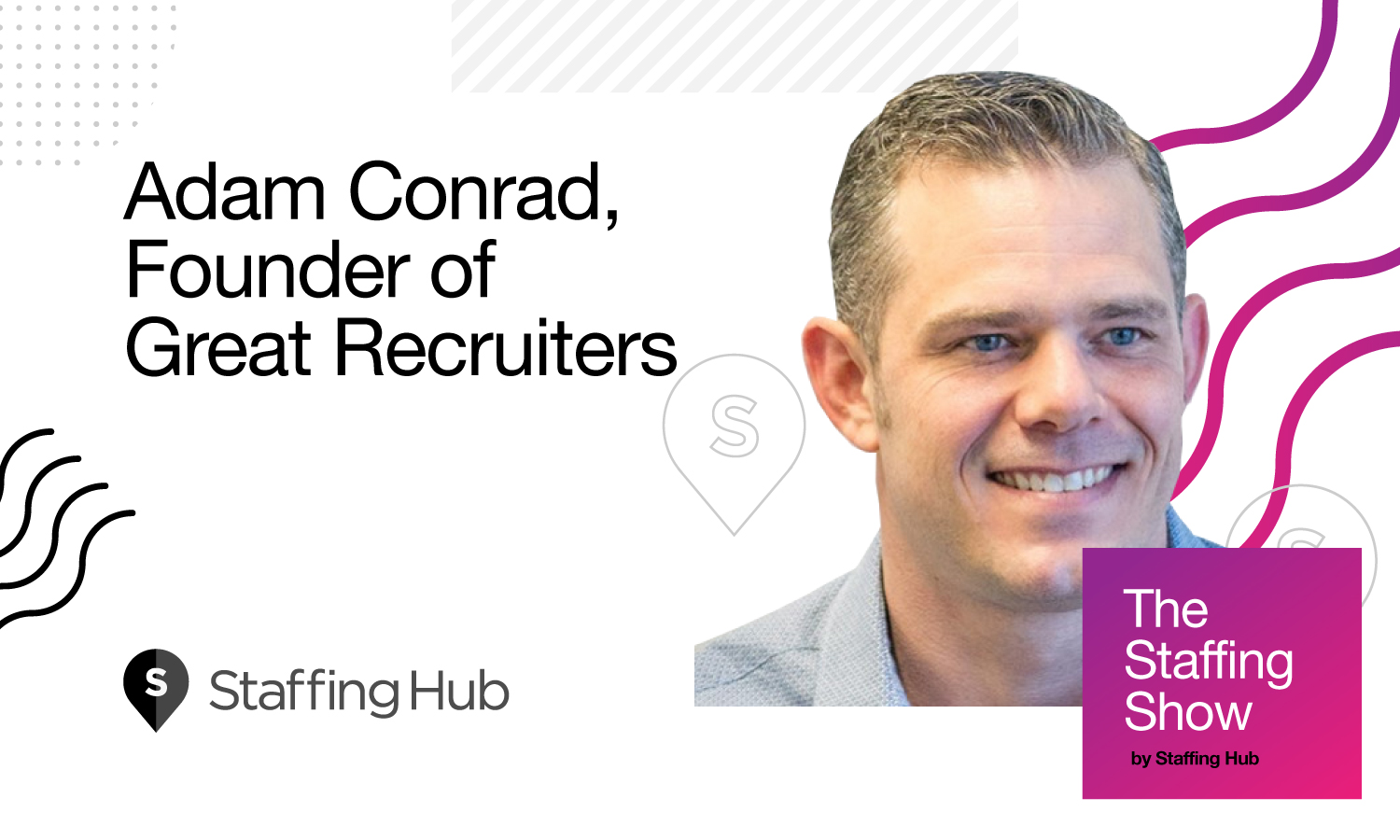
In this episode, Staffing Hub Editor-in-Chief Caitlin Delohery interviews Adam Conrad, a veteran recruiter and founder of Great Recruiters, a job candidate and reputation management platform specifically designed for recruiters and staffing firms.
Adam brings 18 years of recruiting to the table and a powerful desire to change the recruiter stereotype. Recruiters have been getting a bad rap for decades. You might have heard recruiters are slow to respond or they make job promises they can’t keep. And while you know this isn’t even close to the full picture, Adam brings practical advice on how to authentically humanize recruiters and the recruiting process. Hint: it takes a little bravery and a lot of active listening. (Oh, and coaching Little League might help, too.)
Staffing Hub: So we are here today with Adam Conrad, the founder of Great Recruiters. And thank you, Adam, for joining us today.
Adam: Thank you. Appreciate you having me on.
Staffing Hub: So, how did you get obsessed with rehabilitating the reputation of recruiters?
Adam: Yeah. So I’ve been in the recruiting industry for over 18 years prior to founding Great Recruiters, and for me, one of the things that always disturbed me, and I always go back to this, is if you do a search for recruiters, the results are not very favorable. And I know a lot of great recruiters in the industry, and I’d like to think that I did a pretty good job as a recruiter.
There’s a disconnect between the great work that recruiters are doing and those perceptions out there. So for me, I see this as a great industry, and I want it to be able to provide a way to help elevate and grow great recruiters. That’s what brought me to building a platform to help recruiters manage their reputations with their candidates.
Staffing Hub: And I think you have a pretty cool perspective, as someone who is an 18-year veteran of the industry, and somebody who works currently with staffing firms from all over the globe. I was wondering if you could give us some insight on what sets the staffing firms that succeed apart from those who are just getting by?
Adam: Yeah. For one, in the long-term, those who will excel in a competitive marketplace are ones that have embraced recruiting as a relationship business. There’s a number of firms out there that operate very transactionally. Recruiters are trained to be glorified telemarketers pushing job descriptions to candidates, and there’s little value in those types of conversations.
Two, it’s a really hard racket for a recruiter to start over every single time with a new conversation. So for me, it’s always been around building those relationships.
The firms that build relationships well are those that understand every connection you make is an opportunity. The person on the phone could be somebody you place today, it could be somebody you place tomorrow, it could be someone who turns into a great source of referral.
Firms today who embrace that their reputation is everything and that candidates will continue to demand more from recruiters are going to be the ones that really stay on top.
Staffing Hub: Yeah. And the word “reputation” gets thrown around a lot. It has different meanings for people. So I was wondering if you could talk a little bit about reputation in staffing and recruiting.
Adam: Reputation, staffing, and recruiting are your own personal brand as a recruiter. And one of the biggest indicators of a strong reputation is when you see a lot of referrals. From a company standpoint, there’s a lot of review sites out there that don’t provide a strong overview of staffing firms, ’cause the external sites are a bunch of anonymous reviews by people who had a poor experience, and they’re trying to find a way to vent about it.
It’s about taking control of that feedback. And the best way you can take control of your own reputation is to ask for feedback. Be transparent, and find out if there are ways that you can continue to improve and provide value to those people that you serve.
Staffing Hub: Great. And this actually dovetails into one of my next questions. Do you have any other actionable tips that firms looking right now can use to improve their online reputation?
Adam: Yeah. I think, well, first, number one, you need to take control of your reputation.
Whether or not you use our platform, you really need to take that first step to be open to receiving feedback. There are a lot of firms that are fearful of what people are going to say, and you need to turn that fear into an opportunity for growth.
So start asking for feedback. Second, there are sites out there, and there are people who are speaking about your firm on these sites. You can’t ignore them. You have to take an active role in engaging with them. One of the best things you can do is monitor what people are saying, set up Google alerts, and take action when feedback is provided.
Unfortunately, many times, that feedback is anonymous. So you really can’t do anything to resolve that specific situation. But at least from a public-facing standpoint, you can reply to those comments. Many of these tools provide you the ability to comment on a review site.
You also need to make sure the bad reviews aren’t really true. It takes brave people to take a deep look at how they’re interacting. They could ask themselves: if the candidate was my mom, if this was my brother or sister, would I be treating them this way?
And for a lot of firms, that can be scary because it’s a lot of work. It’s a lot easier to just run a fast-paced, high transaction business. But long-term, the key is making sure you have those valuable interactions and have mechanisms in place to be able to measure those interactions. You need to make sure what you’re saying you’re doing is what you’re actually doing. And if it’s not, resolve those issues and take action.
Staffing Hub: Now, in your experience, how have the staffing firms that really ground their performance review and their training in the feedback from candidates found that bravery in themselves to face the music, so to speak?
Adam: Many of the firms that we work with, they always had the bravery. They were just looking for a simple way, a great platform, to help them accomplish that. So I think that a lot of clients who are using our platform today understand the value of the feedback, are committed to not only saying they want to drive great experiences but are committed to tweaking their process and opening themselves up for that feedback.
They’re already a step ahead because they don’t need to be convinced this is important. I think as time goes on, this is going to be as relevant as a job board is.
Staffing Hub: Yeah. And it seems to me that this is all a part of holding the candidate experience at the very center of everything that you and staffing firms do. I wonder what you’ve seen that’s really the foundation of a really great candidate experience?
Adam: Well, a couple things there. There are a lot of companies out there that are talking to only the people that they actually place. But that represents a very small percentage of the people who actually interact with your recruiters. And if you’re looking for just positive feedback, ask the person that you just successfully placed in a job.
If you’re really looking to improve, you need to start asking for feedback more frequently. Most recruiters only place between 2-5% of the people they talk to and recruiters are on the front line of a staffing firm’s brand. If you’re only asking the people you place, you’re losing out on the perspective of 95% of the people who have worked with you.
To great a great experience, you need to set expectations up front. I always like to say, you want to put your agenda second and put the candidate’s agenda first. You don’t want to lead in with saying, I have this great job, is this something you’re interested in? Because if it’s not, the door’s closed. The call’s over.
If you open up and say, “We help a lot of people like you. I’m not sure if I have the right position for you today, but I’d like to learn a little bit more about your goals, values, expectations, motivators, differentiators. Your value.” Then you get a well-rounded understanding of that candidate.
It’s a different conversation. You have to be an active listener. Jobs come with companies. Companies have cultures. People are looking for different things in those cultures. If you don’t discover what culture the candidate is looking for, then you’re just aligning skill sets, and I think that’s where technology and automation are going to replace firms that have that very transactional approach.
Once you make those strong connections, you have to nurture those relationships. You have to be responsive, you have to follow up. You have to demonstrate experience.
Anybody can read a job order, but the value of a recruiter is understanding the intricacies of the hiring manager, the company culture, why it would be a good fit, how it aligns with the candidate — all those little things aid in creating a great experience.
You also need to provide some advice and guidance along the way. If you’re only helping 5% of the people you talk to, you still have an opportunity to provide a lot of value to the other 95%, and those are things that people are going to remember. So later on when the right opportunity comes up, they’re thinking of you. If they become a hiring manager, they’re remembering those things and that experience.
We try to educate and drive recruiters to shift themselves from being this transactional recruiter to being an advisor, a career coach, career advisor, talent advisor. Whatever you want to call it. But enhancing themselves beyond that stigmatism of what recruiters are.
Staffing Hub: That’s interesting. And it seems like there are two trends that you’re pointing to, both this move from transactional recruiting to more relation-based consultative recruiting, and also this push to automate or bring in the right tech tools to take over the more rote parts of the recruiting process. For the staffing firms that you’ve worked with or in your experience, do you have any advice for staffing firms on how they can make smart technology choices that allow their recruiters basically to be more human?
Adam: Yeah. I think that’s a great distinction. How does technology make you more human? Many times people mistake technology to look inward and ask, how can I automate everything? How can I make everything simple for myself? And technology, in my perspective, should be used to enhance that relationship.
Automate those things that are easy to automate, but don’t try to automate the value that a recruiter is providing to a candidate.
Ask how can technology enhance the value for the candidate on the other end. Augment your technology with the human side of this business, and find a way to bring the two together where it makes sense.
Staffing Hub: Yeah. I agree. And, oh, this is shifting gears a little bit, but … So you’ve been coaching kids’ baseball for a couple of years now, and I was wondering if there’s anything that you’ve learned in running around with those kids that you have applied to your work with Great Recruiters in the past few years too.
Adam: Oh, that’s an interesting question. Well, let me tell you, I’ve coached everywhere from four year olds in T-ball where I’ve learned a great deal of patience and fun, to more competitive baseball with my older son who’s going to be 11 here, and he plays competitive baseball.
What have I learned from that that has helped me with Great Recruiters? I think from a coaching perspective, everybody’s different, and everybody needs a different style.
One style of coaching fits really well with one child, but it might not fit well for another. And I think that’s very much like recruiting. You can’t take every conversation to be the same conversation. You really need to understand that individual so you can go ahead and shape that experience of what’s best going to suit them.
This isn’t just coaching recruiters and understanding what type a recruiter is, and then make everybody the same, but really embracing each recruiter’s strengths and trying to really highlight those strengths, and figuring out where the weaknesses are, and what pieces you can put in place to help support those weaknesses.
Staffing Hub: That’s great. I love it. And then, looking ahead, where do you see the staffing, recruiting industry heading in the next couple of years?
Adam: We’re at a really interesting point. We’ve never seen so much technology entering the marketplace, and what’s funny, if you asked me this 18 months ago, my answer would’ve been a little bit different than it is today. But what’s now I’m hearing more about technology humanizing recruitment.
People want relationships and people want to connect. So I think we are going to see more technology coming into the marketplace, and we’re going to see a shift where that technology is helping to humanize the recruitment, not to automate or replace it.
Staffing Hub: That’s awesome. And what’s on the horizon for Great Recruiters?
Adam: There are a number of things that we’re really looking at, and we take a strong interest in learning from our clients and listening to things that they want. And what I’m hearing is it’s around personal brand development, personal brand marketing.
There’s an opportunity to help showcase those great recruiters and to start using our platform to start letting the cream rise to the top, creating a differentiation in the marketplace that not all are recruiters are created equal.
But today, there isn’t a place where you can really find that. And I see that as a great opportunity for Great Recruiters.
Staffing Hub: Well, thank you so much for taking the time to talk to us today. I appreciate it.
Adam: Yeah, thank you so much. I always enjoy, I appreciate the conversation.
Looking for more podcast interviews? Check out all our episodes here.







